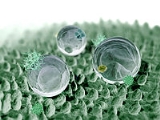
Bionics
Overview
Bionics is the application of biological methods
and systems found in nature
to the study and design of engineering
systems and modern technology
.
The word bionic was coined by Jack E. Steele
in 1958, possibly originating from the technical term
bion (from ), meaning 'unit of life
' and the suffix -ic, meaning 'like' or 'in the manner of', hence 'like life'. Some dictionaries, however, explain the word as being formed as a portmanteau from biology + electronics.
Scientific method
Scientific method refers to a body of techniques for investigating phenomena, acquiring new knowledge, or correcting and integrating previous knowledge. To be termed scientific, a method of inquiry must be based on gathering empirical and measurable evidence subject to specific principles of...
and systems found in nature
Nature
Nature, in the broadest sense, is equivalent to the natural world, physical world, or material world. "Nature" refers to the phenomena of the physical world, and also to life in general...
to the study and design of engineering
Engineering
Engineering is the discipline, art, skill and profession of acquiring and applying scientific, mathematical, economic, social, and practical knowledge, in order to design and build structures, machines, devices, systems, materials and processes that safely realize improvements to the lives of...
systems and modern technology
Technology
Technology is the making, usage, and knowledge of tools, machines, techniques, crafts, systems or methods of organization in order to solve a problem or perform a specific function. It can also refer to the collection of such tools, machinery, and procedures. The word technology comes ;...
.
The word bionic was coined by Jack E. Steele
Jack E. Steele
Jack E. Steele was an American medical doctor and retired US Air Force colonel, most widely known for coining the word bionics.-Biography:Steele was born Jack Ellwood Steele in Lacon, Illinois...
in 1958, possibly originating from the technical term
International Scientific Vocabulary
International scientific vocabulary comprises scientific and specialized words whose language of origin may or may not be certain, but which are in current use in several modern languages. The name "International Scientific Vocabulary" was first used by Philip Gove in Webster’s Third New...
bion (from ), meaning 'unit of life
Life
Life is a characteristic that distinguishes objects that have signaling and self-sustaining processes from those that do not, either because such functions have ceased , or else because they lack such functions and are classified as inanimate...
' and the suffix -ic, meaning 'like' or 'in the manner of', hence 'like life'. Some dictionaries, however, explain the word as being formed as a portmanteau from biology + electronics.
Unanswered Questions

